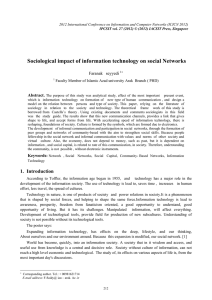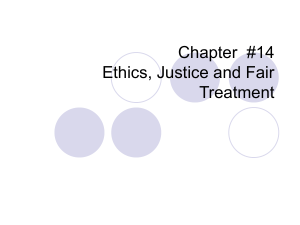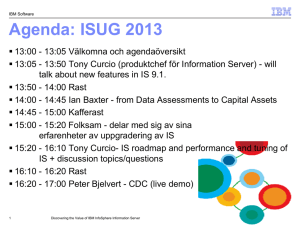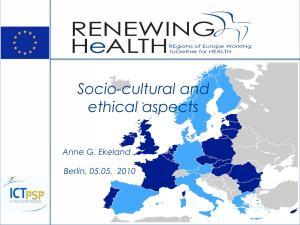infraethics - EIT Foundation
advertisement
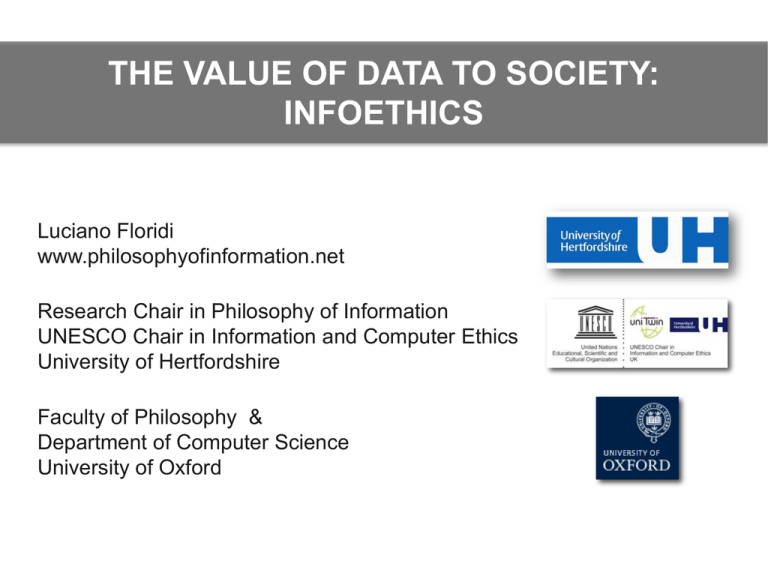
THE VALUE OF DATA TO SOCIETY: INFOETHICS Luciano Floridi www.philosophyofinformation.net Research Chair in Philosophy of Information UNESCO Chair in Information and Computer Ethics University of Hertfordshire Faculty of Philosophy & Department of Computer Science University of Oxford OUTLINE HYPERHISTORY INFOSPHERE FOURTH REVOLUTION INFRAETHICS DATA TIME: HYPERHISTORY No ICTs Individual and social well-being related to ICT Individual and social well-being dependent on ICT DATA SPACE: INFOSPHERE In recent years, the world has been adapting to smart technologies increasingly well. Enveloping the world (data-fication) without fully realising it. In robotics, an envelope (also known as reach envelop) is the threedimensional space that defines the boundaries that the robot can reach. DATA SPACE: INFOSPHERE Dishwasher vs. Humanoid Robot DATA SPACE: INFOSPHERE 22.5 20 17.5 15 12.5 10 7.5 5 Ca. 21% of EU population used a laptop to access 2.5 the internet, via wireless away from home or work. 0 2004 2005 2006 2007 2008 2009 2010 2011 2012 DATA SPACE: INFOSPHERE Inside the computer Outside the computer HUMANITY: THE FOURTH REVOLUTION Knowledge, Science, Technology change our understanding in two fundamental ways. Introvert or about ourselves. Extrovert or about the world. HUMANITY: THE FOURTH REVOLUTION We are not immobile, at the centre of the universe (Copernicus). We are not unnaturally detached and diverse from the rest of the animal world (Darwin). We are not Cartesian subjects entirely transparent to ourselves (Freud). We are not disconnected agents, but informational organisms (inforgs), sharing with biological and engineered agents the infosphere (Turing). INFRAETHICS Create Reuse Erase Collect Many crucial issues in the infosphere (data-based society) are hyperhistorical, DATA including: privacy, data security, intellectual property, liability, and Use data access. Record Transmit Process INFRAETHICS What is needed is an ethical infrastructure (infraethics) that facilitates ethically good decisions, choices and behaviours. Risks Confidence Certainties Legal framework Ethical foundation Examples: Data Protection Directive, General Data Protection Directive. CONCLUSION: A PROPOSAL The Declaration of Helsinki: set of ethical principles regarding human experimentation developed by the World Medical Association. Cornerstone document of human research ethics. Not a legally binding instrument, but very authoritative and influential on legislation and regulations. In terms of ethical principles, what is needed is a European Declaration on InfoEthics that provides the ethical contents for innovation, R&D, application, and use of ICTs. THE VALUE OF DATA TO SOCIETY: INFOETHICS Luciano Floridi www.philosophyofinformation.net SOURCE This research is partly based on Information – A Very Short Introduction (Oxford University Press, 2010), The Philosophy of Information (Oxford University Press, 2011), and The Ethics of Information (Oxford University Press, forthcoming). ACKNOWLEDGEMENTS This research has been supported by a University of Hertfordshire’s QR Grant. COPYRIGHT DISCLAIMER Texts, marks, logos, names, graphics, images, photographs, illustrations, artwork, audio clips, video clips, and software copyrighted by their respective owners are used on these slides for non-commercial, educational and personal purposes only. Use of any copyrighted material is not authorized without the written consent of the copyright holder. Every effort has been made to respect the copyrights of other parties. If you believe that your copyright has been misused, please direct your correspondence to: l.floridi@herts.ac.uk stating your position and I shall endeavour to correct any misuse as early as possible.

